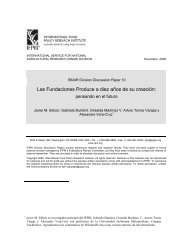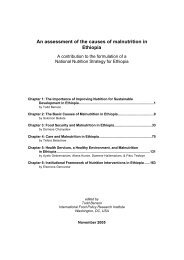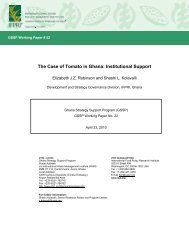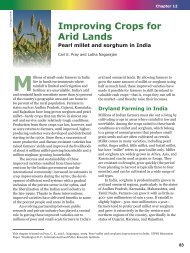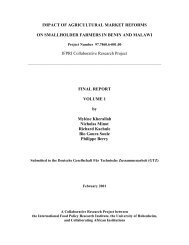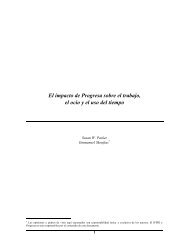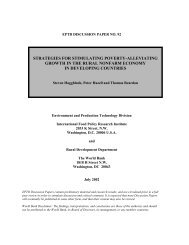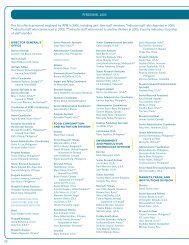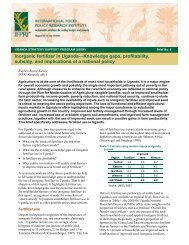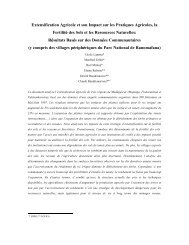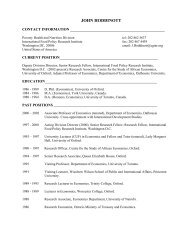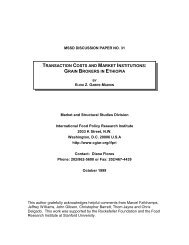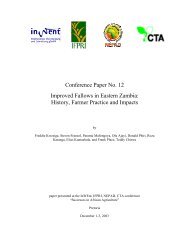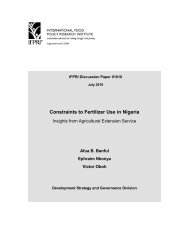An Economic Assessment of Banana Genetic Improvement and ...
An Economic Assessment of Banana Genetic Improvement and ...
An Economic Assessment of Banana Genetic Improvement and ...
You also want an ePaper? Increase the reach of your titles
YUMPU automatically turns print PDFs into web optimized ePapers that Google loves.
160 CHAPTER 11<br />
sumption <strong>and</strong> income from local sales. The<br />
baseline data indicate that direct exposure<br />
to new varieties through formal programs is<br />
no longer a critical determinant <strong>of</strong> their use<br />
in Tanzania, evidence once again that farmer-to-farmer<br />
exchange <strong>of</strong> planting materials<br />
is crucial. The econometric model confirms<br />
this result. Heterogeneity among households<br />
in terms <strong>of</strong> social, demographic, or wealth<br />
characteristics appears to have less importance<br />
in use decisions than does the incidence<br />
<strong>of</strong> pests <strong>and</strong> disease—which motivates<br />
farmers’ search for new materials in<br />
this production system.<br />
Third, it is evident that social capital<br />
plays a significant role in the use <strong>of</strong> current<br />
best practice for managing soil fertility in<br />
banana production in Ug<strong>and</strong>a. Most <strong>of</strong> the<br />
villages in the banana producing areas foster<br />
active social organization, with numerous<br />
associations <strong>and</strong> high rates <strong>of</strong> membership,<br />
although membership in economic<br />
associations is more exclusive. Village social<br />
characteristics will likely have especially<br />
important implications for planting<br />
material systems for EAHBs, because transfers<br />
<strong>of</strong> planting material <strong>and</strong> related information<br />
are based on farmers themselves<br />
rather than on a formal seed industry.<br />
The productivity <strong>of</strong> cooking bananas<br />
<strong>and</strong> the factors that determine it depend on<br />
the economic, climate, <strong>and</strong> soil characteristics<br />
<strong>of</strong> regions, <strong>and</strong> as hypothesized, it is<br />
highest in the southwest, least in Central<br />
Region, <strong>and</strong> intermediate in Masaka. There<br />
is some evidence that the efficiency <strong>of</strong> banana<br />
production can be improved, particularly<br />
in Central Region. Labor productivity<br />
is higher in Central Region, where most<br />
agronomic practices (such as crop sanitation)<br />
are carried out minimally. Soil pH <strong>and</strong><br />
the application <strong>of</strong> manure as recommended<br />
have positive <strong>and</strong> significant effects on productivity,<br />
especially in the southwest <strong>and</strong><br />
Central Region <strong>of</strong> Ug<strong>and</strong>a. The critical importance<br />
<strong>of</strong> labor is evident in findings regarding<br />
the age <strong>of</strong> the household head <strong>and</strong><br />
family size. Road infrastructure <strong>and</strong> production<br />
credit will enhance efficiency.<br />
Findings illustrate substantial inefficiencies<br />
in the production <strong>of</strong> cooking bananas,<br />
especially in central Ug<strong>and</strong>a. Education improves<br />
technical efficiency in the southwest<br />
but not in central Ug<strong>and</strong>a. Market access<br />
(using distance to paved roads as a proxy)<br />
improves efficiency for the sample farmers<br />
in Masaka <strong>and</strong> southwest but not in the Central<br />
Region, where opportunity costs <strong>of</strong><br />
labor are higher. Household size is positively<br />
related to efficiency but is only significant<br />
for central Ug<strong>and</strong>a. <strong>Banana</strong> production<br />
appears to be more efficient when<br />
managed by men than by women, probably<br />
due to underlying differentials in access to<br />
resources. Access to credit increases efficiency<br />
in the Central Region, whereas rent<br />
<strong>and</strong> remittances improve efficiency in Masaka<br />
<strong>and</strong> the southwest.<br />
Policies to improve production efficiency<br />
include investments in education,<br />
extension, <strong>and</strong> infrastructure (roads), <strong>and</strong><br />
improving access to production credit for<br />
commercially oriented producers in the<br />
southwest <strong>and</strong> Masaka areas. Clearly, policies<br />
will need to be tailored to the local<br />
conditions, as demonstrated by the different<br />
production <strong>and</strong> efficiency pr<strong>of</strong>iles <strong>of</strong> the<br />
three regions analyzed here.<br />
The analysis <strong>of</strong> banana production efficiency<br />
reveals the presence <strong>of</strong> surplus<br />
labor in the highl<strong>and</strong>s, whereas access to<br />
farm labor is a constraint in the lowl<strong>and</strong>s.<br />
Wages are higher for casual labor in the<br />
lowl<strong>and</strong>s, where there is a more developed<br />
market for unskilled labor. Investment in<br />
technology development could raise banana<br />
productivity in the highl<strong>and</strong>s. In the<br />
lowl<strong>and</strong>s, both technology development<br />
<strong>and</strong> extension education have positive effects<br />
on productivity. Investment in human<br />
capital (especially women’s education) <strong>and</strong><br />
enabling better access to input <strong>and</strong> credit<br />
markets could improve banana production;<br />
investments in the paved road network<br />
would improve the comparative advantage<br />
<strong>of</strong> the region in banana production. Intercropping<br />
bananas could be interfering with<br />
the implementation <strong>of</strong> certain practices



